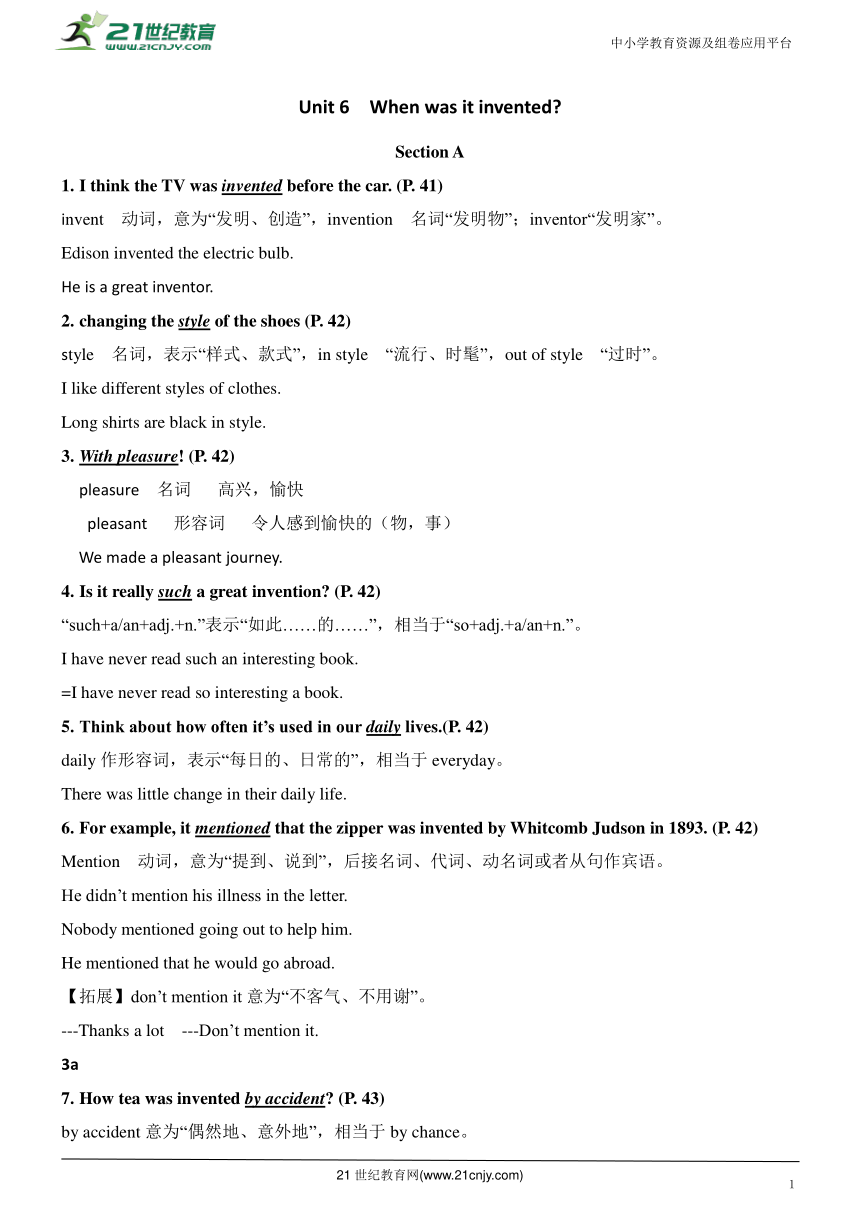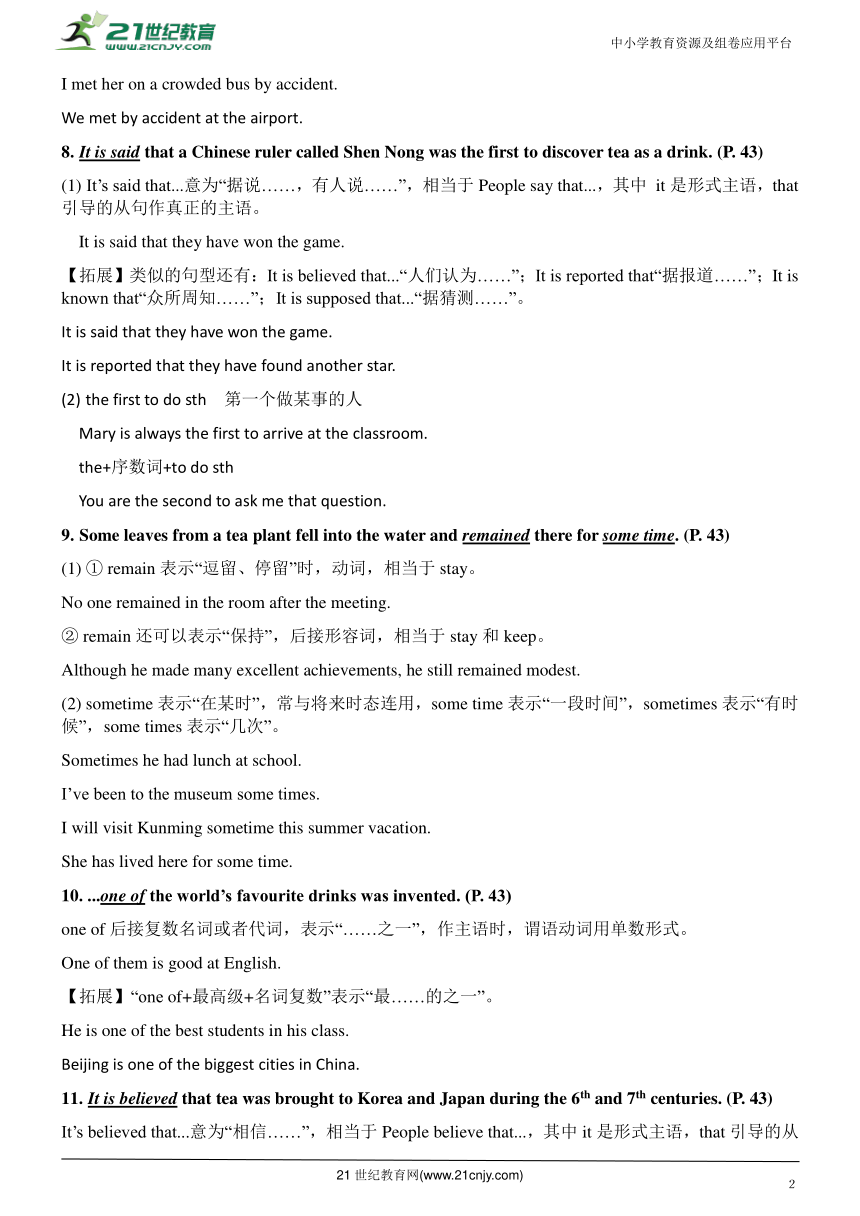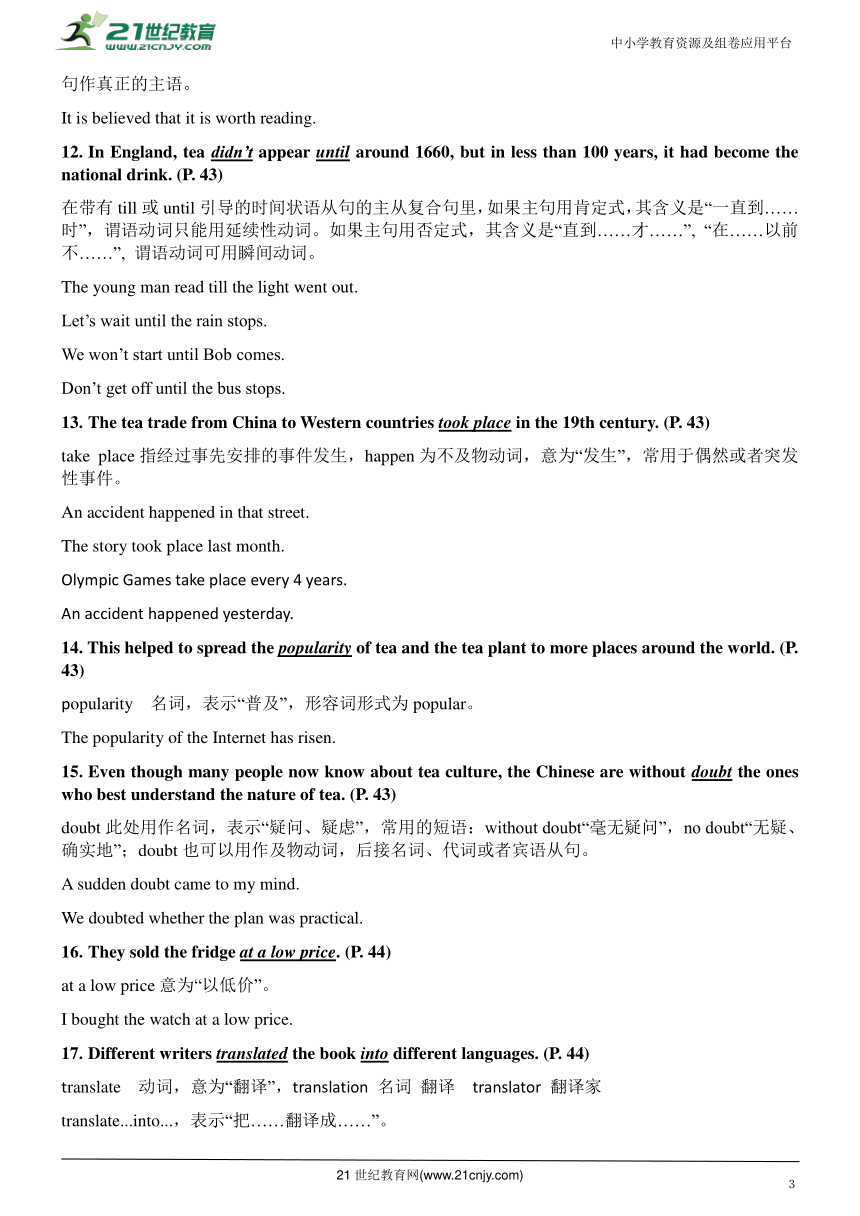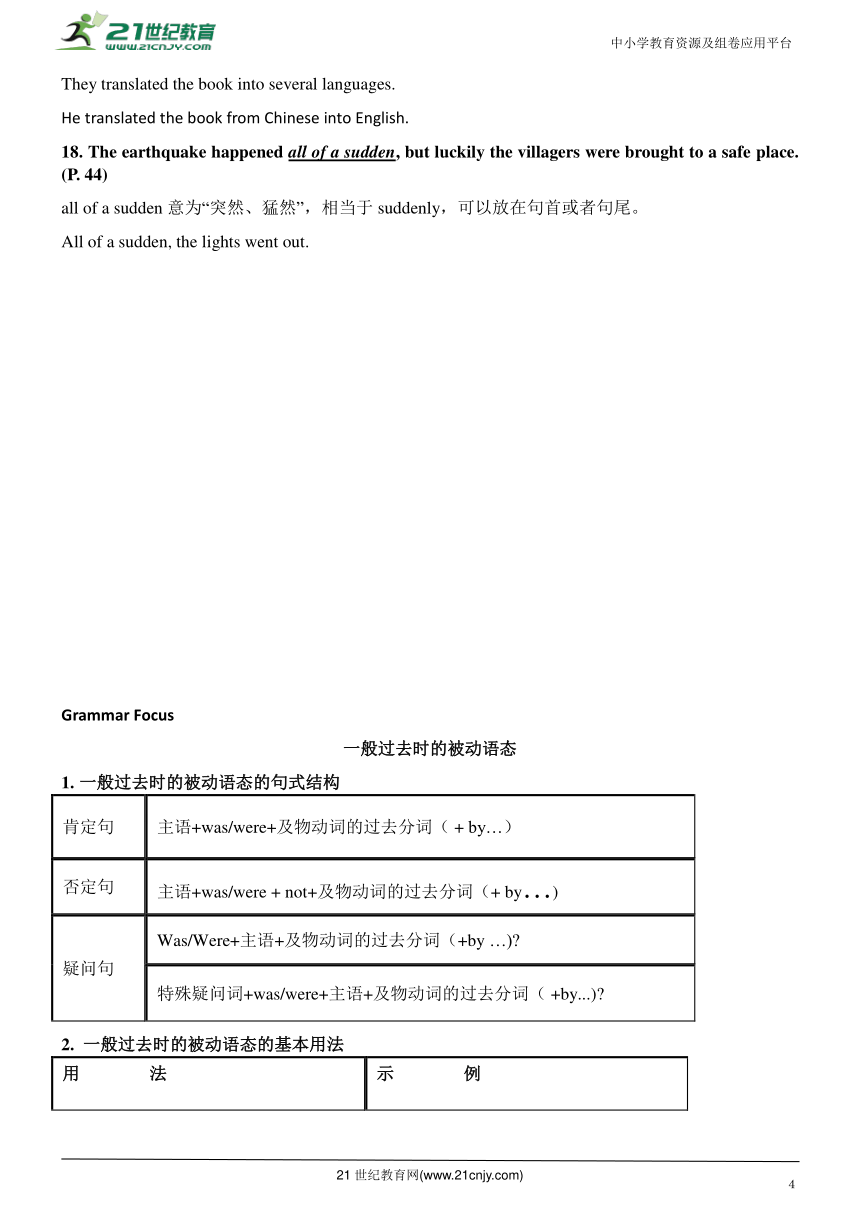Unit 6 When was it invented知识点总结归纳【人教版英语九年级全册】
文档属性
| 名称 | Unit 6 When was it invented知识点总结归纳【人教版英语九年级全册】 |  | |
| 格式 | docx | ||
| 文件大小 | 56.9KB | ||
| 资源类型 | 试卷 | ||
| 版本资源 | 人教新目标(Go for it)版 | ||
| 科目 | 英语 | ||
| 更新时间 | 2024-06-13 19:05:45 | ||
图片预览




文档简介
中小学教育资源及组卷应用平台
Unit 6 When was it invented
Section A
I think the TV was invented before the car. (P. 41)
invent 动词,意为“发明、创造”,invention 名词“发明物”;inventor“发明家”。
Edison invented the electric bulb.
He is a great inventor.
changing the style of the shoes (P. 42)
style 名词,表示“样式、款式”,in style “流行、时髦”,out of style “过时”。
I like different styles of clothes.
Long shirts are black in style.
With pleasure! (P. 42)
pleasure 名词 高兴,愉快
pleasant 形容词 令人感到愉快的(物,事)
We made a pleasant journey.
Is it really such a great invention (P. 42)
“such+a/an+adj.+n.”表示“如此……的……”,相当于“so+adj.+a/an+n.”。
I have never read such an interesting book.
=I have never read so interesting a book.
Think about how often it’s used in our daily lives.(P. 42)
daily作形容词,表示“每日的、日常的”,相当于everyday。
There was little change in their daily life.
For example, it mentioned that the zipper was invented by Whitcomb Judson in 1893. (P. 42)
Mention 动词,意为“提到、说到”,后接名词、代词、动名词或者从句作宾语。
He didn’t mention his illness in the letter.
Nobody mentioned going out to help him.
He mentioned that he would go abroad.
【拓展】don’t mention it意为“不客气、不用谢”。
---Thanks a lot ---Don’t mention it.
3a
How tea was invented by accident (P. 43)
by accident意为“偶然地、意外地”,相当于by chance。
I met her on a crowded bus by accident.
We met by accident at the airport.
It is said that a Chinese ruler called Shen Nong was the first to discover tea as a drink. (P. 43)
It’s said that...意为“据说……,有人说……”,相当于People say that...,其中 it是形式主语,that引导的从句作真正的主语。
It is said that they have won the game.
【拓展】类似的句型还有:It is believed that...“人们认为……”;It is reported that“据报道……”;It is known that“众所周知……”;It is supposed that...“据猜测……”。
It is said that they have won the game.
It is reported that they have found another star.
the first to do sth 第一个做某事的人
Mary is always the first to arrive at the classroom.
the+序数词+to do sth
You are the second to ask me that question.
Some leaves from a tea plant fell into the water and remained there for some time. (P. 43)
(1) ① remain表示“逗留、停留”时,动词,相当于stay。
No one remained in the room after the meeting.
② remain还可以表示“保持”,后接形容词,相当于stay和keep。
Although he made many excellent achievements, he still remained modest.
(2) sometime表示“在某时”,常与将来时态连用,some time表示“一段时间”,sometimes表示“有时候”,some times表示“几次”。
Sometimes he had lunch at school.
I’ve been to the museum some times.
I will visit Kunming sometime this summer vacation.
She has lived here for some time.
10. ...one of the world’s favourite drinks was invented. (P. 43)
one of后接复数名词或者代词,表示“……之一”,作主语时,谓语动词用单数形式。
One of them is good at English.
【拓展】“one of+最高级+名词复数”表示“最……的之一”。
He is one of the best students in his class.
Beijing is one of the biggest cities in China.
It is believed that tea was brought to Korea and Japan during the 6th and 7th centuries. (P. 43)
It’s believed that...意为“相信……”,相当于People believe that...,其中it是形式主语,that引导的从句作真正的主语。
It is believed that it is worth reading.
In England, tea didn’t appear until around 1660, but in less than 100 years, it had become the national drink. (P. 43)
在带有till或until引导的时间状语从句的主从复合句里,如果主句用肯定式,其含义是“一直到……时”,谓语动词只能用延续性动词。如果主句用否定式,其含义是“直到……才……”, “在……以前不……”, 谓语动词可用瞬间动词。
The young man read till the light went out.
Let’s wait until the rain stops.
We won’t start until Bob comes.
Don’t get off until the bus stops.
The tea trade from China to Western countries took place in the 19th century. (P. 43)
take place指经过事先安排的事件发生,happen为不及物动词,意为“发生”,常用于偶然或者突发性事件。
An accident happened in that street.
The story took place last month.
Olympic Games take place every 4 years.
An accident happened yesterday.
14. This helped to spread the popularity of tea and the tea plant to more places around the world. (P. 43)
popularity 名词,表示“普及”,形容词形式为popular。
The popularity of the Internet has risen.
Even though many people now know about tea culture, the Chinese are without doubt the ones who best understand the nature of tea. (P. 43)
doubt此处用作名词,表示“疑问、疑虑”,常用的短语:without doubt“毫无疑问”,no doubt“无疑、确实地”;doubt也可以用作及物动词,后接名词、代词或者宾语从句。
A sudden doubt came to my mind.
We doubted whether the plan was practical.
They sold the fridge at a low price. (P. 44)
at a low price意为“以低价”。
I bought the watch at a low price.
Different writers translated the book into different languages. (P. 44)
translate 动词,意为“翻译”,translation 名词 翻译 translator 翻译家
translate...into...,表示“把……翻译成……”。
They translated the book into several languages.
He translated the book from Chinese into English.
The earthquake happened all of a sudden, but luckily the villagers were brought to a safe place. (P. 44)
all of a sudden意为“突然、猛然”,相当于suddenly,可以放在句首或者句尾。
All of a sudden, the lights went out.
Grammar Focus
一般过去时的被动语态
一般过去时的被动语态的句式结构
肯定句 主语+was/were+及物动词的过去分词( + by…)
否定句 主语+was/were + not+及物动词的过去分词(+ by…)
疑问句 Was/Were+主语+及物动词的过去分词(+by …)
特殊疑问词+was/were+主语+及物动词的过去分词( +by...)
2. 一般过去时的被动语态的基本用法
用 法 示 例
表示过去某一具体时间发生的动作,且句子的主语是谓语动词动作的承受者 The house was built in 1990. 这所房子建于1990年。
讲述发生在过去的动作,且不知道动作的执行者 He was honored with the name “ Father of Hybrid Rice”. 他被授予“杂交水稻之父”的称号。
3. 含双宾语和复合宾语的主动句变为被动语态的方法
①含有双宾语的主动句变为被动语态时,通常把指 “人”的间接宾语变为主语,而指“物”的直接宾语则不变。
He gave me a book yesterday.
I was given a book (by him) yesterday.
②如果要把指“物”的直接宾语变为主语,则在间接宾语前加to或for。
I brought him some food.
Some food was brought to him (by me).
③含有复合宾语的主动句变为被动语态时,要将其中的宾语变成主语,宾语补足语不变。
Jim asked Tom to go for a walk.
Tom was asked (by Jim) to go for a walk.
④ 如果宾语补足语是不带to的动词不定式,主动语态变成被动语态时要加上不定式符号 to。
We often heard Kate sing in the room.
Kate was often heard to sing in the room (by us).
Section B
Potato chips were invented by mistake. (P. 45)
by mistake意为“错误地、无意中”,介词短语
I took your pen by mistake.
He put salt into her tea by mistake.
The customer was happy in the end. (P. 45)
in the end意为“最后、最终”,相当于at last或者finally。
They were out danger in the end.
【拓展】at the end of意为“在……末尾、在……尽头”;by the end of“到……末为止”;in the end“最后、终于”。
At the end of this month, we will have a test.
How many English words had you learnt by the end of last term.
He will be a teacher in the end.
2b
It is over 100 years old and is played by more than 100 million people in over 200 countries. (P. 46)
over此处意为“多于、超过”,相当于more than,说明数目和程度。
There are over/more than four hundred students in our school.
Then in 1936 in Berlin, it became an event at the Olympics. (P. 46)
the Olympics意为“奥林匹克运动会”。
What do you like about the Olympics
Dr. Naismith created a game to be played inside on a hard floor. (P. 46)
to be played是动词不定式to play的被动形式,to be played用作后置定语,修饰game,两者是被动关系。
Are you going to attend the meeting to held this afternoon
Dr. Naismith divided the men in his class into two teams and taught them to play his new game. (P. 46)
divide 动词 分开,划分
divide...into...表示“把……分成……”,被动结构为:be divided into“被分成……”。
Let’s divide ourselves into several groups.
teach sb. to do sth.“教某人做某事”。
He taught us to serve the people heart and soul.
At the same time, they need to stop the competing team from getting the ball into their own basket. (P. 46)
at the same time意为“同时”。
We both got to school at the same time this morning.
stop...from doing sth.“阻止……做某事”,相当于prevent/keep...from doing sth.。
The workers had to work for hours to stop the ship from going down.
The heavy snow stopped him from coming to our party.
Basketball has not only become a popular sport to play,but it has also become a popular sport to watch.
not only...but also...为并列连词词组,意为“不但......而且......”,主要用于连接两个并列成分。
Not only Tom but also the twins are from America.
连接主语
Peter not only writes well but also speaks fluently.
连接谓语
Mary can speak not only French but also Russian.
连接宾语
注意:not only...but also...连接并列主语时,谓语动词的形式与离它最近的主语保持一致。
Not only the students but also the teacher was invited.
谓语动词与最近的主语teacher保持一致。
Today, the popularity of basketball had risen around the world, with many young people dreaming of becoming famous players. (P. 46)
dream of/about doing sth.意为“梦想做某事”。
The boy dreamed of becoming a scientist.
Many young people look up to these basketball heroes and want to become like them. (P. 46)
look up to “钦佩、仰慕”,后接名词或者代词做宾语。
They look up to him for his knowledge.
These stars encourage young people to work hard to achieve their dreams. (P. 46)
encourage 动词 “鼓励” encouragement 名词 鼓励
encourage sb. to do sth.“鼓励某人做某事”。
The family members encouraged her to fight against the disease bravely.
The teacher encourage his students to study hard.
encourage sb in sth 在...方面鼓励某人
My mother encourage me in learning English.
achieve one’s dream意为“实现某人的梦想”,achieve 动词,意为“实现、达到”。
I am sure that he will achieve his dream in the end.
作文(3b)
This special pen was invented by Liu Jie. It has three colors and is used for taking notes quickly in class. It is very useful if you have a lot to write down. The pen comes with a microchip that can store a list of common words that you will use. You can program the words you will use often to each word. When you are writing, you just need to write the short forms with the pen, press a button on the pen and all short forms will change into the actual words. The microchip can contain up to 50 words and you can make changes to the list of words whenever you need to.
21世纪教育网(www.21cnjy.com)
Unit 6 When was it invented
Section A
I think the TV was invented before the car. (P. 41)
invent 动词,意为“发明、创造”,invention 名词“发明物”;inventor“发明家”。
Edison invented the electric bulb.
He is a great inventor.
changing the style of the shoes (P. 42)
style 名词,表示“样式、款式”,in style “流行、时髦”,out of style “过时”。
I like different styles of clothes.
Long shirts are black in style.
With pleasure! (P. 42)
pleasure 名词 高兴,愉快
pleasant 形容词 令人感到愉快的(物,事)
We made a pleasant journey.
Is it really such a great invention (P. 42)
“such+a/an+adj.+n.”表示“如此……的……”,相当于“so+adj.+a/an+n.”。
I have never read such an interesting book.
=I have never read so interesting a book.
Think about how often it’s used in our daily lives.(P. 42)
daily作形容词,表示“每日的、日常的”,相当于everyday。
There was little change in their daily life.
For example, it mentioned that the zipper was invented by Whitcomb Judson in 1893. (P. 42)
Mention 动词,意为“提到、说到”,后接名词、代词、动名词或者从句作宾语。
He didn’t mention his illness in the letter.
Nobody mentioned going out to help him.
He mentioned that he would go abroad.
【拓展】don’t mention it意为“不客气、不用谢”。
---Thanks a lot ---Don’t mention it.
3a
How tea was invented by accident (P. 43)
by accident意为“偶然地、意外地”,相当于by chance。
I met her on a crowded bus by accident.
We met by accident at the airport.
It is said that a Chinese ruler called Shen Nong was the first to discover tea as a drink. (P. 43)
It’s said that...意为“据说……,有人说……”,相当于People say that...,其中 it是形式主语,that引导的从句作真正的主语。
It is said that they have won the game.
【拓展】类似的句型还有:It is believed that...“人们认为……”;It is reported that“据报道……”;It is known that“众所周知……”;It is supposed that...“据猜测……”。
It is said that they have won the game.
It is reported that they have found another star.
the first to do sth 第一个做某事的人
Mary is always the first to arrive at the classroom.
the+序数词+to do sth
You are the second to ask me that question.
Some leaves from a tea plant fell into the water and remained there for some time. (P. 43)
(1) ① remain表示“逗留、停留”时,动词,相当于stay。
No one remained in the room after the meeting.
② remain还可以表示“保持”,后接形容词,相当于stay和keep。
Although he made many excellent achievements, he still remained modest.
(2) sometime表示“在某时”,常与将来时态连用,some time表示“一段时间”,sometimes表示“有时候”,some times表示“几次”。
Sometimes he had lunch at school.
I’ve been to the museum some times.
I will visit Kunming sometime this summer vacation.
She has lived here for some time.
10. ...one of the world’s favourite drinks was invented. (P. 43)
one of后接复数名词或者代词,表示“……之一”,作主语时,谓语动词用单数形式。
One of them is good at English.
【拓展】“one of+最高级+名词复数”表示“最……的之一”。
He is one of the best students in his class.
Beijing is one of the biggest cities in China.
It is believed that tea was brought to Korea and Japan during the 6th and 7th centuries. (P. 43)
It’s believed that...意为“相信……”,相当于People believe that...,其中it是形式主语,that引导的从句作真正的主语。
It is believed that it is worth reading.
In England, tea didn’t appear until around 1660, but in less than 100 years, it had become the national drink. (P. 43)
在带有till或until引导的时间状语从句的主从复合句里,如果主句用肯定式,其含义是“一直到……时”,谓语动词只能用延续性动词。如果主句用否定式,其含义是“直到……才……”, “在……以前不……”, 谓语动词可用瞬间动词。
The young man read till the light went out.
Let’s wait until the rain stops.
We won’t start until Bob comes.
Don’t get off until the bus stops.
The tea trade from China to Western countries took place in the 19th century. (P. 43)
take place指经过事先安排的事件发生,happen为不及物动词,意为“发生”,常用于偶然或者突发性事件。
An accident happened in that street.
The story took place last month.
Olympic Games take place every 4 years.
An accident happened yesterday.
14. This helped to spread the popularity of tea and the tea plant to more places around the world. (P. 43)
popularity 名词,表示“普及”,形容词形式为popular。
The popularity of the Internet has risen.
Even though many people now know about tea culture, the Chinese are without doubt the ones who best understand the nature of tea. (P. 43)
doubt此处用作名词,表示“疑问、疑虑”,常用的短语:without doubt“毫无疑问”,no doubt“无疑、确实地”;doubt也可以用作及物动词,后接名词、代词或者宾语从句。
A sudden doubt came to my mind.
We doubted whether the plan was practical.
They sold the fridge at a low price. (P. 44)
at a low price意为“以低价”。
I bought the watch at a low price.
Different writers translated the book into different languages. (P. 44)
translate 动词,意为“翻译”,translation 名词 翻译 translator 翻译家
translate...into...,表示“把……翻译成……”。
They translated the book into several languages.
He translated the book from Chinese into English.
The earthquake happened all of a sudden, but luckily the villagers were brought to a safe place. (P. 44)
all of a sudden意为“突然、猛然”,相当于suddenly,可以放在句首或者句尾。
All of a sudden, the lights went out.
Grammar Focus
一般过去时的被动语态
一般过去时的被动语态的句式结构
肯定句 主语+was/were+及物动词的过去分词( + by…)
否定句 主语+was/were + not+及物动词的过去分词(+ by…)
疑问句 Was/Were+主语+及物动词的过去分词(+by …)
特殊疑问词+was/were+主语+及物动词的过去分词( +by...)
2. 一般过去时的被动语态的基本用法
用 法 示 例
表示过去某一具体时间发生的动作,且句子的主语是谓语动词动作的承受者 The house was built in 1990. 这所房子建于1990年。
讲述发生在过去的动作,且不知道动作的执行者 He was honored with the name “ Father of Hybrid Rice”. 他被授予“杂交水稻之父”的称号。
3. 含双宾语和复合宾语的主动句变为被动语态的方法
①含有双宾语的主动句变为被动语态时,通常把指 “人”的间接宾语变为主语,而指“物”的直接宾语则不变。
He gave me a book yesterday.
I was given a book (by him) yesterday.
②如果要把指“物”的直接宾语变为主语,则在间接宾语前加to或for。
I brought him some food.
Some food was brought to him (by me).
③含有复合宾语的主动句变为被动语态时,要将其中的宾语变成主语,宾语补足语不变。
Jim asked Tom to go for a walk.
Tom was asked (by Jim) to go for a walk.
④ 如果宾语补足语是不带to的动词不定式,主动语态变成被动语态时要加上不定式符号 to。
We often heard Kate sing in the room.
Kate was often heard to sing in the room (by us).
Section B
Potato chips were invented by mistake. (P. 45)
by mistake意为“错误地、无意中”,介词短语
I took your pen by mistake.
He put salt into her tea by mistake.
The customer was happy in the end. (P. 45)
in the end意为“最后、最终”,相当于at last或者finally。
They were out danger in the end.
【拓展】at the end of意为“在……末尾、在……尽头”;by the end of“到……末为止”;in the end“最后、终于”。
At the end of this month, we will have a test.
How many English words had you learnt by the end of last term.
He will be a teacher in the end.
2b
It is over 100 years old and is played by more than 100 million people in over 200 countries. (P. 46)
over此处意为“多于、超过”,相当于more than,说明数目和程度。
There are over/more than four hundred students in our school.
Then in 1936 in Berlin, it became an event at the Olympics. (P. 46)
the Olympics意为“奥林匹克运动会”。
What do you like about the Olympics
Dr. Naismith created a game to be played inside on a hard floor. (P. 46)
to be played是动词不定式to play的被动形式,to be played用作后置定语,修饰game,两者是被动关系。
Are you going to attend the meeting to held this afternoon
Dr. Naismith divided the men in his class into two teams and taught them to play his new game. (P. 46)
divide 动词 分开,划分
divide...into...表示“把……分成……”,被动结构为:be divided into“被分成……”。
Let’s divide ourselves into several groups.
teach sb. to do sth.“教某人做某事”。
He taught us to serve the people heart and soul.
At the same time, they need to stop the competing team from getting the ball into their own basket. (P. 46)
at the same time意为“同时”。
We both got to school at the same time this morning.
stop...from doing sth.“阻止……做某事”,相当于prevent/keep...from doing sth.。
The workers had to work for hours to stop the ship from going down.
The heavy snow stopped him from coming to our party.
Basketball has not only become a popular sport to play,but it has also become a popular sport to watch.
not only...but also...为并列连词词组,意为“不但......而且......”,主要用于连接两个并列成分。
Not only Tom but also the twins are from America.
连接主语
Peter not only writes well but also speaks fluently.
连接谓语
Mary can speak not only French but also Russian.
连接宾语
注意:not only...but also...连接并列主语时,谓语动词的形式与离它最近的主语保持一致。
Not only the students but also the teacher was invited.
谓语动词与最近的主语teacher保持一致。
Today, the popularity of basketball had risen around the world, with many young people dreaming of becoming famous players. (P. 46)
dream of/about doing sth.意为“梦想做某事”。
The boy dreamed of becoming a scientist.
Many young people look up to these basketball heroes and want to become like them. (P. 46)
look up to “钦佩、仰慕”,后接名词或者代词做宾语。
They look up to him for his knowledge.
These stars encourage young people to work hard to achieve their dreams. (P. 46)
encourage 动词 “鼓励” encouragement 名词 鼓励
encourage sb. to do sth.“鼓励某人做某事”。
The family members encouraged her to fight against the disease bravely.
The teacher encourage his students to study hard.
encourage sb in sth 在...方面鼓励某人
My mother encourage me in learning English.
achieve one’s dream意为“实现某人的梦想”,achieve 动词,意为“实现、达到”。
I am sure that he will achieve his dream in the end.
作文(3b)
This special pen was invented by Liu Jie. It has three colors and is used for taking notes quickly in class. It is very useful if you have a lot to write down. The pen comes with a microchip that can store a list of common words that you will use. You can program the words you will use often to each word. When you are writing, you just need to write the short forms with the pen, press a button on the pen and all short forms will change into the actual words. The microchip can contain up to 50 words and you can make changes to the list of words whenever you need to.
21世纪教育网(www.21cnjy.com)
同课章节目录
- Unit 1 How can we become good learners.
- Section A
- Section B
- Unit 2 I think that mooncakes are delicious!
- Section A
- Section B
- Unit 3 Could you please tell me where the restroom
- Section A
- Section B
- Unit 4 I used to be afraid of the dark.
- Section A
- Section B
- Unit 5 What are the shirts made of?
- Section A
- Section B
- Review of Units 1-5
- Unit 6 When was it invented?
- Section A
- Section B
- Unit 7 Teenagers should be allowed to choose their
- Section A
- Section B
- Unit 8 It must belong to Carla.
- Section A
- Section B
- Unit 9 I like music that I can dance to.
- Section A
- Section B
- Unit 10 You're supposed to shake hands.
- Section A
- Section B
- Review of Units 6-10
- Unit 11 Sad movies make me cry.
- Section A
- Section B
- Unit 12 Life is full of the unexpected
- Section A
- Section B
- Unit 13 We're trying to save the earth!
- Section A
- Section B
- Unit 14 I remember meeting all of you in Grade 7.
- Section A
- Section B
- Review of Units 11-14
